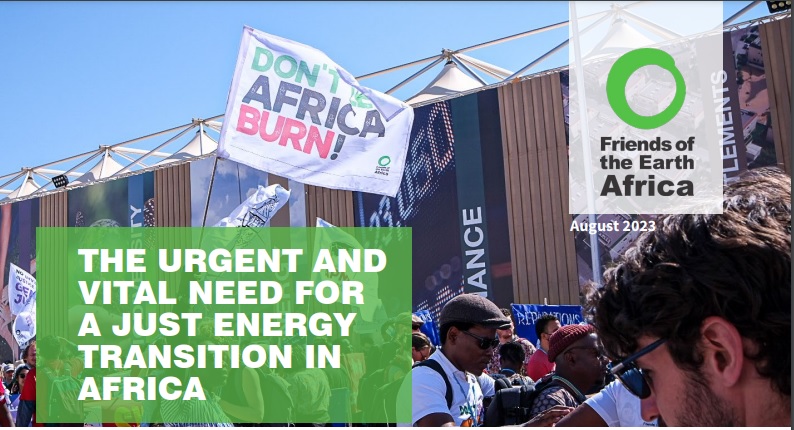
by Babawale Obayanju and Ubrei – Joe Maimoni Mariere
Africa, home to one-fifth of the global population, has contributed about 3% of the world’s carbon dioxide (CO2) emissions, representing the lowest emissions per capita[1] among regions. Yet, the continent faces the most devastating consequences of climate change, exacerbated by the COVID-19 pandemic and geopolitical conflicts. This opinion piece delves into the crucial intersection of the climate crisis, energy systems, and the imperative for a just feminist transition in Africa, urging African leaders and global stakeholders to embrace an equitable approach to safeguard the environment and uplift communities.
Africa’s Climate Plight: A Call to Action
While Africa’s carbon contribution is comparatively minor, its vulnerability to climate impacts is immense. Recent events, such as the 2022 Nigerian floods and Cyclone Idai’s devastation in Mozambique, Zimbabwe, and Malawi, underline the urgent need for comprehensive climate policies. These incidents, disproportionately affecting marginalized communities, emphasize the necessity for immediate and ambitious climate mitigation strategies.
Energy Predicament: Balancing Need and Sustainability
Amid the climate crisis, Africa’s energy landscape presents a formidable challenge. Millions on the continent lack access to reliable electricity and clean cooking facilities, thus contributing to energy poverty. The Russia-Ukraine conflict, however, threatens to undermine progress, with both Northern and African governments seeking to expand their search for oil and gas on the African continent. The African Union’s stance on incorporating fossil fuels in energy access raises concern, as it contradicts the global push to drastically reduce the global average temperatures below 1.5oC while moving towards clean renewables. Europe’s wavering commitment to gas in its own energy mix while bolstering fossil fuel investments in Africa risks exacerbating environmental degradation, and climate injustice, and furthering the patterns of neocolonialist extractivism on the continent.
The Just Transition, False Solutions, and Sustainable Progress
Friends of the Earth Africa believes that Africa holds unparalleled potential for harnessing renewable energy sources, including solar and wind, which could transform its energy landscape. However, the challenge lies not only in adopting clean energy but also ensuring an equitable transition process. The transition must prioritize protecting ecosystems, local livelihoods, and communities while providing universal access to energy. Grassroots resistance in South Africa and Mozambique against harmful energy projects exemplifies the imperative for environmentally conscious development.
Amid the race to combat climate change, Friends of the Earth Africa says caution must be exercised against embracing false solutions – in the form of carbon markets, offsets, and removals – as is shown on the agenda of the upcoming Africa Climate Summit where it is planned to operationalize the carbon market initiative, proposed by McKinsey and company an American consulting company in collaboration with Sustainable Energy for All, the Global Energy Alliance for People and Planet and the Rockefeller Foundation.
This will compromise the environment and vulnerable communities. Geoengineering initiatives like solar radiation, sky whitening, ocean fertilization, and ill-conceived ‘nature-based solutions’ risk masking the deep-rooted changes necessary for meaningful emissions reduction. Instead of relying on carbon markets and offsets, a people-led energy revolution grounded in clean renewable, democratic, and locally informed solutions is imperative.
Financing the Just Transition Agenda for Africa’s Energy
The forthcoming Africa Climate Summit (ACS) holds immense potential to redefine Africa’s energy future. Friends of the Earth Africa urges the all participating government and leaders to prioritize a just transition to renewable energy, advocating for a complete phase-out of fossil fuels and halting new dirty energy projects. The focus should be on clean, safe energy sources, respect for indigenous and community rights, safeguarding biodiversity, and minimizing environmental harm. ACS must reject all false narratives that support gas as a transition fuel and any form of false solutions – carbon markets, offsets, and removals in Africa. This approach will decentralize energy access, bridging the gap between rural and urban areas.
Addressing the historical climate debt owed to Africa is essential for equitable progress. Funds should flow into the Loss and Damage finance mechanisms established at COP27, free from loans or insurance that could exacerbate economic imbalances. Utilizing existing funds, including those hidden in tax havens, could fuel Africa’s renewable energy revolution. A successful transition hinges on simultaneously addressing climate debt and inequality, buttressed by favorable political and economic conditions.
As Africa seeks a renewable future, responsible mineral extraction is vital. Safeguarding communities, livelihoods, and environments from further harm demands cleaner and safer extraction methods. Balancing resource demand with environmental stewardship will require strong labor rights, collective organizing, and worker retraining, ensuring that progress benefits all.
Conclusion
The Africa Climate Summit has the potential to redefine Africa’s trajectory in confronting the climate crisis. By centering on a just energy transition, the summit can foster equitable development, clean energy access, and environmental stewardship. As Friends of the Earth Africa, we believe urgency is undeniable: Africa’s challenges are global, and the continent’s success in navigating the energy crisis can serve as a blueprint for a sustainable future worldwide. In the end, the pursuit of a just transition is not only Africa’s responsibility but a collective endeavor for a more resilient and harmonious planet.
[1] https://www.iea.org/reports/africa-energy-outlook-2022/key-findingshttps://www.iea.org/reports/africa-energy-outlook-2022/key-findings
Photo Credit : Sharon Pittaway on unsplash.com


